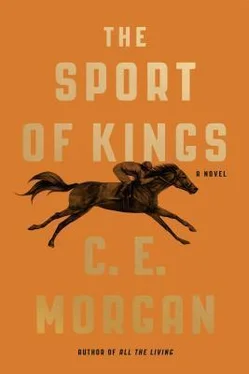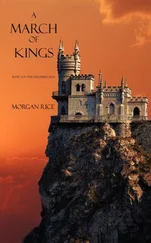“How would I know?” Maryleen said gruffly with her back still turned.
“What were you and Filip arguing about?”
“Folks argue,” she said sharply. “It’s no concern of yours.”
“But—”
She turned quickly then, trying to project more passion and less fear than she felt. Her eyes were wide. “He said something nasty about my mother, all right? And I don’t care to talk about it anymore!”
Henry said nothing in response to this, only reared back slightly with distaste or wariness, and Maryleen made a quiet drama of calming herself for his benefit, but she could have cried with relief when he finally walked haltingly, sullenly to the kitchen door that led outside. He stood there on the step for a long moment with his hands in his pockets, surveying the orchard, which was quiet now, deserted, and full of ragged shadows. Then he walked out onto the grass lit yellow with the fading afternoon, and he turned suddenly. Maryleen, who’d been eyeing him like a hawk from the kitchen window, thrust her hands under the faucet and pretended to wash, but from the side of her eyes, she watched as Henry cast a wary glance back over the house, looking it up and down. And though she didn’t believe in God at all, and certainly not in some white man in the sky who’d sanctioned everything evil in this world, she prayed.
* * *
Church: the father, the son, the holy ghost, and his mother — his own original, originating Lavinia! — who always fanned Henry’s heavy head when he nodded off, enveloping him in a rosed perfume and the unnamed scent of her person. There was a change in her son, she eyed him now with the wariness of a doe that senses the hunter is afoot. He didn’t lean into her on the pew anymore, didn’t doze like a child against her shoulder; he no longer smiled.
Dark dissatisfaction ran through him like a coal seam. He no longer cared for the old, unsatisfying stories, the Bible just a crass country cousin to the myths and nothing more. He counted the commandments: Honor thy mother and thy father. Really? Why? So you could climb some rickety ladder to heaven? When he sat in those worn pews and tried to imagine God’s heaven, all he could conjure was a glistering expanse of nothingness. Roads of gold stretched without event farther than imagination, farther than forever, until his hope of heaven was a distress, and his heart flagged in his chest. Henry knew you had to make your own heaven — a place where, when your mother said she loved you above all others, it meant that she loved you more than a lover, more than God. He was newly sick to his stomach. Was church the wrong place to pray for the death of a man?
The ride back to Forge Run was an exercise in strained silence, his father concentrating on the road, Henry turned mulishly to the passing fields. The theater of razed greenery was fading before their eyes under the blue autumn sky, death hatching a mottled dun on the withering shocks. Their dying bored him to death. Easy come, easy go. His eyes slashed the back of his father’s head, and his tongue felt perverse. Loose. He could not latch it to his better sense, which was silence. He said, “I can’t stand to listen to all that preaching about rules.” His voice felt like breaking something.
There was no immediate response. His father seemed determined to teach him the rudest of life lessons: there is nothing worse than being ignored.
“I’m tired of rules for no reasons.” This time his belligerence was barely contained.
Without turning his head, John Henry said, “That you don’t understand the reason for a rule is no indication of its absence.”
Henry sulked, his shoulders crouching down around his spine. Then he reached forward suddenly and pressed on his mother’s shoulder until she turned.
“Do you believe God answers prayers?”
She raised her brows, her pretty mouth puckered, and they both inclined their heads in mutual misunderstanding like confused dancers curtsying.
“Yes or no?” he said, impatient.
“Leave your mother be,” said John Henry, but the boy was staring at his mother angrily and frowning.
Do you understand me? he signed.
She nodded.
Do you understand the preacher? he signed with terse, pithy gestures.
She smiled a smile like an apology.
“You mean you don’t understand him?” He said this out loud.
She shrugged.
“Father!” he cried accusingly. “She doesn’t even understand what the preacher’s saying! I always thought she was reading his lips!”
John Henry said nothing.
“Then why even bother going to church?” he spat, but his mother was swiveling away from him to face forward. He tapped her on her shoulder, hard, and he said, “Why even go, then?” And then she turned and brushed at his hand as if it were a fly and not her own son, and he had never seen her do that. He sat back in surprise.
“Be quiet, Henry,” said his father, one slate eye to the rearview mirror.
Henry seethed, clenched his jaw, and locked eyes with John Henry. His mother ignored them both and gazed out her window, refusing them. Henry fairly boiled with irritation all the way home, but when they reached the house, John Henry didn’t cut the purring motor as expected, or pull alongside the house. Instead, he idled on the circular drive that traced the front of the estate. He gestured to his wife to go on in without them, so she slid from her seat and stood awkwardly on the drive. Henry refused to look at her, only assumed her place slump-shouldered, and John Henry eased down the lane again. No one looked back to see Lavinia standing still where she had been, a solitary figure with a bright yellow clutch tight in her hands, her face cast in shadow by her half veil.
Henry wanted to ask where they were going, but he refused to speak, so they drove in silence, two men hard and unbending with thirty-five years between them. Henry wrapped his arms around himself, though it was warm enough in the car, closing his eyes and feigning disinterest. When he opened them, he didn’t know where they were and recognized none of the farms on either side of the road.
He finally buckled. “Where are we going?”
“I want to show you something,” said John Henry, “because of your recent concerns.”
“About what?” In the ensuing silence, his regret was instant. His father was always biding his time, withholding answers like scraps from a bitch.
When they turned east onto a new gravel road, John Henry slacked his speed and coasted to the top of a gradual incline, where they attained a broad view of the green, rolling hills. They parked on the side of the road and John Henry pointed, but it was not necessary, because there was nothing else to see but the farm.
The property was situated directly before them, a vast spread of impossibly verdant green that rolled like ocean swells, the bright fields curbed by virgin white plank fencing. The scattered barns and outbuildings were dressed in white and green, all cupolaed and topped by striding iron horses not yet gone to verdigris in the weather. The vanes wheeled and spun in a high wind that seemed to come from all directions at once. The barns were pristine, no dirt or manure to mar their snowy sides, no stray chaff or markings on the sun-sparked fan windows. Brick walks paved paths from building to building, and men led horses into paddocks and out of barns, and the horses were dark and leggy. North of the barns, far beyond the horses, the main house was an astonishment: Ionic-columned and endlessly gabled, shingled in a gray almost white, and built to four towering stories, from which it gazed down on the adventure of its own beauty. The acreage stretched beyond sight in all directions but one, and there a threadbare tobacco barn stood beyond the last line of fencing, a poor and classless interloper, only its upper half visible from its perch on a declivitous slope, where it leaned away from its new neighbors, boards rafting into disrepair, a sorry sight before stupendous wealth.
Читать дальше
Конец ознакомительного отрывка
Купить книгу












